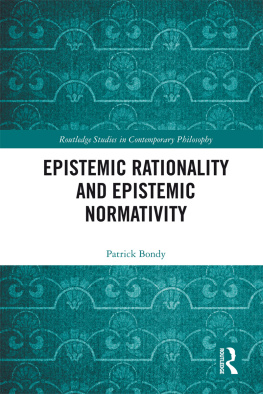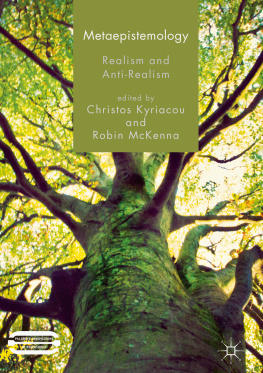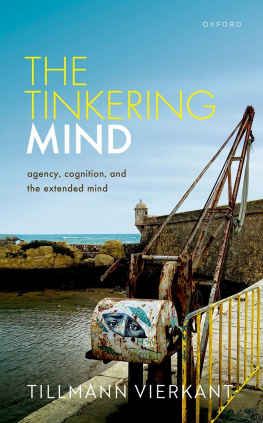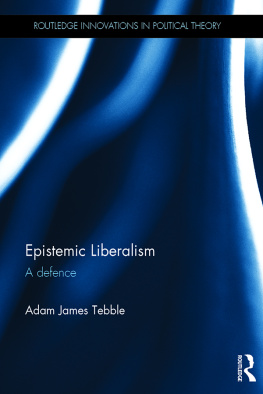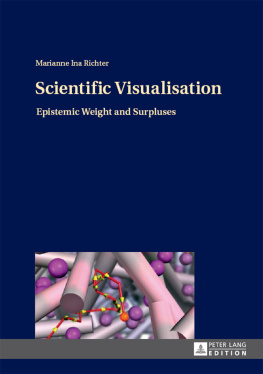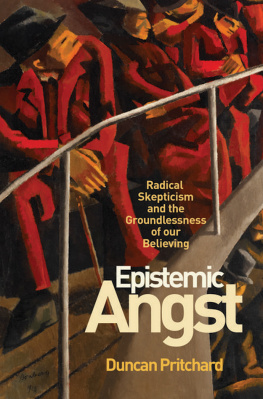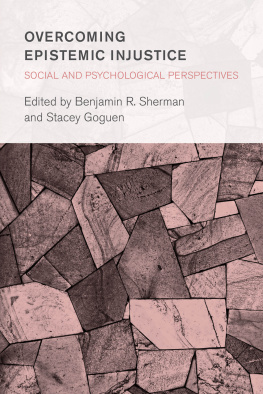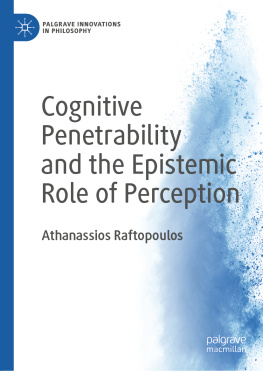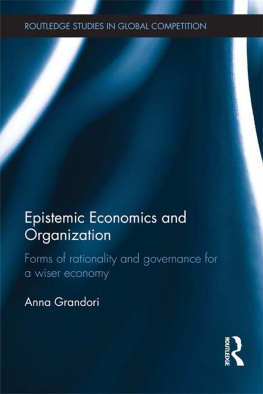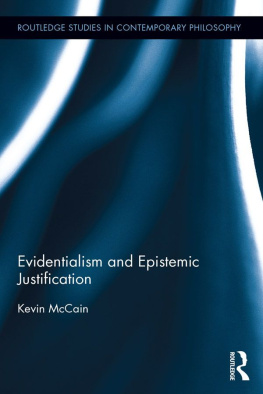Bondy - Epistemic rationality and epistemic normativity
Here you can read online Bondy - Epistemic rationality and epistemic normativity full text of the book (entire story) in english for free. Download pdf and epub, get meaning, cover and reviews about this ebook. year: 2018, publisher: Routledge, genre: Romance novel. Description of the work, (preface) as well as reviews are available. Best literature library LitArk.com created for fans of good reading and offers a wide selection of genres:
Romance novel
Science fiction
Adventure
Detective
Science
History
Home and family
Prose
Art
Politics
Computer
Non-fiction
Religion
Business
Children
Humor
Choose a favorite category and find really read worthwhile books. Enjoy immersion in the world of imagination, feel the emotions of the characters or learn something new for yourself, make an fascinating discovery.
- Book:Epistemic rationality and epistemic normativity
- Author:
- Publisher:Routledge
- Genre:
- Year:2018
- Rating:5 / 5
- Favourites:Add to favourites
- Your mark:
- 100
- 1
- 2
- 3
- 4
- 5
Epistemic rationality and epistemic normativity: summary, description and annotation
We offer to read an annotation, description, summary or preface (depends on what the author of the book "Epistemic rationality and epistemic normativity" wrote himself). If you haven't found the necessary information about the book — write in the comments, we will try to find it.
Bondy: author's other books
Who wrote Epistemic rationality and epistemic normativity? Find out the surname, the name of the author of the book and a list of all author's works by series.
Epistemic rationality and epistemic normativity — read online for free the complete book (whole text) full work
Below is the text of the book, divided by pages. System saving the place of the last page read, allows you to conveniently read the book "Epistemic rationality and epistemic normativity" online for free, without having to search again every time where you left off. Put a bookmark, and you can go to the page where you finished reading at any time.
Font size:
Interval:
Bookmark:

The aim of this book is to answer two important questions about the issue of normativity in epistemology: Why are epistemic reasons evidential, and what makes epistemic reasons and rationality normative? Bondys argument proceeds on the assumption that epistemic rationality goes hand in hand with basing beliefs on good evidence. The opening chapters defend a mental-state ontology of reasons, a deflationary account of how kinds of reasons are distinguished, and a deliberative guidance constraint on normative reasons. They also argue in favor of doxastic voluntarismthe view that beliefs are subject to our direct voluntary controland embrace the controversial view that voluntarism bears directly on the question of what kinds of things count as reasons for believing. The final three chapters of the book feature a noteworthy critique of the instrumental conception of the nature of epistemic rationality, as well as a defense of the instrumental normativity of epistemic rationality. The final chapter defends the view that epistemic reasons and rationality are normative for us when we have normative reason to get to the truth with respect to some proposition, and it provides a response to the Swamping Problem for monistic accounts of value.
Patrick Bondy is Assistant Professor at Saint Marys University, Canada. He has previously held appointments at Trent University and Brandon University and a Postdoctoral Fellowship with the Sage School of Philosophy at Cornell University. His research has appeared in Dialogue, Synthese, American Philosophical Quarterly, Metaphilosophy, Philosophia, Episteme, Logos & Episteme, Informal Logic, and Pacific Philosophical Quarterly.
For a full list of titles in this series, please visit www.routledge.com
94Isnt That Clever
A Philosophical Account of Humor and Comedy
Steven Gimbel
95Trust in the World
A Philosophy of Film
Josef Frchtl
96Taking the Measure of Autonomy
A Four-Dimensional Theory of Self-Governance
Suzy Killmister
97The Legacy of Kant in Sellars and Meillassoux
Analytic and Continental Kantianism
Edited by Fabio Gironi
98Subjectivity and the Political
Contemporary Perspectives
Edited by Gavin Rae and Emma Ingala
99Aspect Perception after Wittgenstein
Seeing-As and Novelty
Edited by Michael Beaney, Brendan Harrington and Dominic Shaw
100Nature and Normativity
Biology, Teleology, and Meaning
Mark Okrent
101Formal Epistemology and Cartesian Skepticism
In Defense of Belief in the Natural World
Tomoji Shogenji
102Epistemic Rationality and Epistemic Normativity
Patrick Bondy

First published 2018
by Routledge
711 Third Avenue, New York, NY 10017
and by Routledge
2 Park Square, Milton Park, Abingdon, Oxon OX14 4RN
Routledge is an imprint of the Taylor & Francis Group, an informa business
2018 Taylor & Francis
The right of Patrick Bondy to be identified as author of this work has been asserted by him in accordance with sections 77 and 78 of the Copyright, Designs and Patents Act 1988.
All rights reserved. No part of this book may be reprinted or reproduced or utilised in any form or by any electronic, mechanical, or other means, now known or hereafter invented, including photocopying and recording, or in any information storage or retrieval system, without permission in writing from the publishers.
Trademark notice: Product or corporate names may be trademarks or registered trademarks, and are used only for identification and explanation without intent to infringe.
Library of Congress Cataloging-in-Publication Data
Names: Bondy, Patrick, author.
Title: Epistemic rationality and epistemic normativity / by Patrick Bondy.
Description: 1 [edition]. | New York : Routledge, 2017. |
Series: Routledge studies in contemporary philosophy ; 102 | Includes bibliographical references and index.
Identifiers: LCCN 2017044427 | ISBN 9781138220584 (hardback : alk. paper)
Subjects: LCSH: Epistemics. | Evidence.
Classification: LCC B820.3 .B66 2017 | DDC 121dc23
LC record available at https://lccn.loc.gov/2017044427
ISBN: 978-1-138-22058-4 (hbk)
ISBN: 978-1-315-41253-5 (ebk)
Typeset in Sabon
by Apex CoVantage, LLC
I am happy to acknowledge the intellectual debts I owe to many people for the help theyve given me in developing the ideas in this book; without them this book simply would not exist in its current form.
are largely based on parts of my doctoral dissertation, and so I want first of all to thank David Hitchcock, my thesis supervisor; my thesis and defence committee members Mark Vorobej, Brian Garrett, and Nick Griffin; and John Turri, my external examiner, for the careful reading and helpful feedback they provided on earlier formulations of these ideas.
For careful reading and helpful discussion of various draft chapters, I am very grateful to Benjamin Wald, Daniel Coren, Fabio Shecaira, Jeremy Livingston, Ariane Hanemaayer, Dustin Olson, and Carl Ginet. For discussion which has helped me develop and clarify my ideas, I want to thank David Kovacs, Ru Ye, Adam Bendorf, Lu Teng, Andrew Chignell, J. Adam Carter, Duncan Pritchard, Jason Stanley, Christina Behme, Daniel Mittag, Daniel Fogal, Harvey Siegel, and other audience members and commentators at various conferences and colloquia, including the Canadian Philosophical Association, the Canadian Society for Epistemology, the McMaster University Philosophy Speakers Series, the Dalhousie University Philosophy Speakers Series, the European Conference on Argumentation, the Values in ArgumentationValues of Argumentation conference at the Universidade Nova de Lisboa, and the Eastern Division conference of the American Philosophical Association. I would also like to thank two blind reviewers at Routledge for their very useful feedback.
The research for , which was originally published as Epistemic Deontologism and Strong Doxastic Voluntarism: A Defense, Dialogue (2015), was supported by a SSHRC Postdoctoral Fellowship. I have also benefitted from a Visiting Research Fellowship at the Institute for Advanced Studies in the Humanities (IASH) at the University of Edinburgh, which was made possible by SSHRC; the Consortium of Humanities Centers and Institutes (CHCI); the School of Philosophy, Psychology, and Language Science (PPLS) at the University of Edinburgh; and of course, IASH itself.
Finally, to Kari, who has supported and put up with me during the writing of this book: you are the very best!
Imagine that you own a line of fancy transatlantic cruise ships, and business is good. One day, one of your captains alerts you to an apparent problem with one of your ships. Concerned, you have a full inspection done, which reveals that the ship is in very bad shape; in fact theres an even chance that it wont survive another voyage. You therefore put it in dry dock to be repaired and congratulate yourself on your conscientiousness.
Now imagine a slightly different case. You are still the owner of a line of fancy transatlantic cruise ships; one of your captains alerts you to an apparent problem with one of your ships, and to appease your captain, you have a full inspection done. The inspection reveals that the ship is in very bad shape; in fact theres an even chance that it wont survive another trip. Butcurse your greedy soul!you dread the prospect of paying for the repairs and having to refund the tickets that have already been sold. So you proceed to convince yourself that the ship will most likely survive another trip, doctor the inspection results, and send the ship on its final voyage. Out on the deep and treacherous waters, it goes down, taking every unfortunate soul with it.
Font size:
Interval:
Bookmark:
Similar books «Epistemic rationality and epistemic normativity»
Look at similar books to Epistemic rationality and epistemic normativity. We have selected literature similar in name and meaning in the hope of providing readers with more options to find new, interesting, not yet read works.
Discussion, reviews of the book Epistemic rationality and epistemic normativity and just readers' own opinions. Leave your comments, write what you think about the work, its meaning or the main characters. Specify what exactly you liked and what you didn't like, and why you think so.

